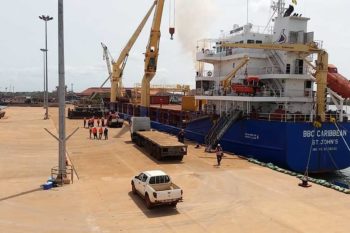
Chinese traders are preparing to export alumina to reap the profits from record prices for spot cargoes after the United States imposed sanctions on Russia’s United Company Rusal.
Rusal is among the biggest producers of the aluminium raw material in the world, while China is the world’s biggest producer and consumer of alumina, a compound extracted from bauxite ore that is then smelted into aluminium metal.
The Rusal sanctions have upended the aluminium supply chain, as companies cut contracts to use Rusal metal, leaving producers of cans or auto parts scrambling for supplies, which is likely to feed into higher costs for end users such as automakers, like Toyota, or beer can makers like Ball.
Rusal, the world’s second-biggest aluminium producer, produces about 6 percent of the global alumina supply and the sanctions have exacerbated a shortfall in the market after a plant in Brazil was forced to halve output earlier in the year.
A logistics source with operations in China confirmed trading houses were preparing alumina for export.
“It hasn’t been exported yet. It’s being stockpiled for export,” the source said.
Reuters was unable to confirm the quantities on hand.
Exports in April may remain small but they could increase to between 120,000 to 180,000 tonnes for May, said Wan Ling, an analyst at metals consultancy, CRU.
“There are signs that China will start exporting alumina,” said Wan. “Because the arbitrage is quite big, some trading houses in China have started to export alumina from ports in China, from bonded warehouses and from alumina refineries, from some ports in Shandong province and from Guangxi Province.”
Aluminium makers with alumina refineries in Shandong include a plant in Zibo owned by Aluminium Corp of China, or Chalco, a China Hongqiao Ltd refinery in Binzhou and a refinery operated by Chiping Xinfa Huayu Alumina Co in Liaocheng. All three companies did not immediately respond to requests for comment.
The Chinese companies are hoping to cash in on surging alumina prices. An alumina cargo bound for Brazil for May delivery sold at $800 per tonne on Wednesday, said Wan.
This is a 45 percent increase from $550 a tonne for Australian cargoes that was reported on Wednesday. A typical alumina shipment carries 30,000 tonnes of metal.
“We have never seen these prices before. Prices may stay strong or go higher,” said Wan.
U.S. aluminium producer Alcoa said Wednesday during its first-quarter results call that there was a possibility of Chinese alumina exports but it could not confirm there was any supply exiting China yet.
Alcoa forecasts a global alumina market deficit of between 300,000 to 1.1 million metric tonnes this year, primarily due to supply disruptions in the Atlantic region.
Global alumina supply is forecast to be 126 million tonnes this year, according to UBS.
China exported 55,737 tonnes of alumina last year, according to data from the General Administration of Customs.
Agency Report
